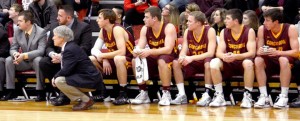At any Cobber men’s basketball game it is clear that head coach Rich Glas is the person in charge. He is the one pacing the sideline and instructing the players that are on the court. At times he may even be badgering the refs for a call to go in Concordia’s favor.
On the court there is direct communication between Glas and his players. Off the court, however, communication between the head coach and the players is the responsibility of the coaches sitting at the end of the bench: the four assistants.

“[The players and the assistants] are pretty close,” junior Austin Nelson said. “If you have a concern or a complaint the head coach can be intimidating at times. You can go in and talk them about anything.”
Assistant coach Grant Hemmingsen said he is a “communicator” and a “set of ears” between the player and the head coach, especially when dealing with personal or academic issues.
“Your basic job is to make the head coach’s job as easy as possible,” Hemmingsen said.
Other responsibilities of the assistant coaches include organizing busing, lodging and food when the team is on the road. Assistant coach Matt Petersen said his job is to be like a “mini travel agent.”
“Your roles [as an assistant coach] are recruiting and helping with budgets.” Petersen said.
Typically the recruiting process will start when the potential recruit is in the mid-late part of his junior year in high school.
“We’ll get in contact with them and try to get their GPA and ACT,” Petersen said. “We try to find players that might qualify for the Presidential [Distinction] Scholarship.”
The requirements of the Presidential Distinction Scholarship are a minimum cumulative high school GPA of 3.8 and an ACT composite score of 27 or SAT score of 1,220.
It is important what academic scholarship the potential recruit qualifies for because of the competitive recruiting in the local area and because Concordia does not offer athletic scholarships.
However, Petersen says that the biggest pitch they give potential recruits has nothing to do with basketball.
“Our biggest pitch is not necessarily playing time,” he said. “It’s our grad school acceptance rates. We have what they want and [we] can get them into grad school.”
The potential recruit will then normally visit campus in the fall before the start of the high school season.
For Nelson, a graduate of Moorhead Senior High School, the recruiting process was fairly simple.
“It was just a couple of phone calls and some letters in the mail,” he said.
After getting in touch and meeting a potential recruit, it becomes a matter of determining who will best fit at Concordia.
“Sometimes the best recruiting you can do is deciding who not to recruit,” Petersen said. “You pick and choose the attitudes you bring into your locker room.”
It is at this point when communication between the assistant coaches is vital.
“Me and Matt have to be on the same page as to who we bring in,” Hemmingsen said.
Both Petersen and Hemmingsen said that local kids are key to the success of the program.
“We try to get the best local kids,” Petersen said. “That’s how we can have interest in our program.”
However this does not mean that there is no interest in recruits from other areas.
“The basketball in this area has talent but it’s not the same with other teams in our league,” Petersen said referring to the plethora of MIAC schools in the Twin Cities area. “There’s so many schools like us down there.”
To help them standout, Petersen and Hemmingsen use a tool they call the “Concordia Connection.”
“It definitely helps if someone in their family has gone to Concordia,” Petersen said.
Senior Jordan Bolger from Apple Valley, Minn. and senior Tom Fraase from Bismark, N.D., who have combined for over 1,500 career points, both have family ties to Concordia.
“That’s huge,” Petersen said.
Hemmingsen describes being an assistant coach as a “crazy lifestyle.”
Besides updating Glas on the real life events of the players, the assistant coaches need to be fully dedicated to the team by not only knowing the characteristics of their own team, but also the characteristics of their opponents.
“It’s not about you,” he said. “Your job as assistant coach is for the greater good.”
Both Hemmingsen and Petersen credit the players on the team for being motivated on the court, but also more importantly in the classroom.
“Our players play for the love of the game,” Hemmingsen said. “They’re so busy and academically driven.”
For Hemmingsen, coaching is less about the wins and losses and more about the relationships built.
“It’s not about wins or losses,” Hemmingsen said. “It’s about seeing each other 10 years later and crossing the road to say ‘Hi.’”

